Coronavirus cases have dropped to levels seen before the second wave spiralled out of control, official figures reveal today.
Test and Trace figures show 106,474 new Covid patients tested positive for the virus in England in the seven-day spell ending February 10 — a 30 per cent drop week-on-week. By comparison, more than 300,000 patients were spotted during the darkest days of the crisis in January.
Weekly infections sat at around the 100,000 mark in October, when the outbreak began to spread rapidly, and during the first week of December, when England’s third national lockdown was lifted.
It came as testing for the South African B.1.351 variant — which makes vaccines slightly less effective — was rolled out to yet more postcodes today, as ministers seek to stop the strain becoming established on British soil. Door-to-door testing will be rolled out in Leeds.
The promising fall in infections comes as Boris Johnson faces growing clamour for a speedier lifting of lockdown measures. The PM is set to unveil his ‘roadmap’ back to normality on Monday, with his ‘prudent’ approach set to make pubs and restaurants among the last places to reopen.
Business chiefs and politicians have demanded an accelerated timeframe to save firms from collapse, amid fears that restrictions might last for months, citing the success of the vaccine rollout and significant falls in deaths and infections. Even one of No10’s scientific advisers yesterday said the data was ‘pointing in the right direction’ for some brutal curbs on daily freedoms to be eased soon.
But despite swathes of data showing the worst of the second wave is now behind Britain, there are still hints the decline in infections has started to slow.
Britain yesterday confirmed 12,718 new cases, which was only a tiny drop (2.3 per cent) on the week before. And a symptom-tracking app has claimed infections are rising in parts of the UK, including Scotland, Northern Ireland, Yorkshire, the North East and the East Midlands.
Any turn in the trend could be devastating now, with the Government inching closer to finally lifting lockdown for good. But doctors and scientists say they want infection and hospital numbers as close to zero as possible before draconian restrictions end.
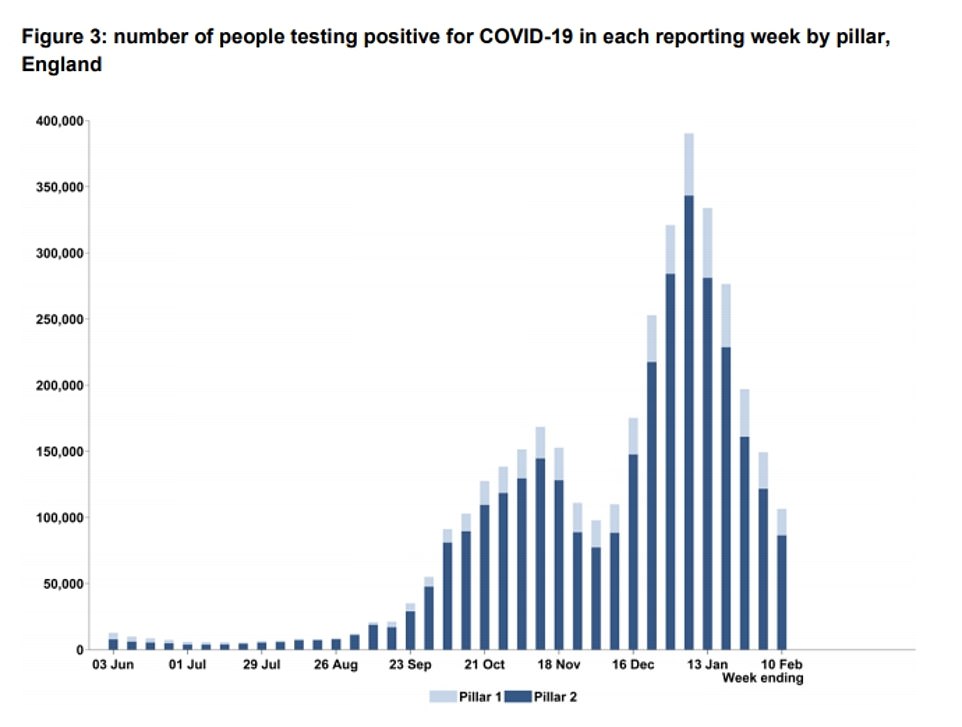
Test and Trace data shows there were 106,474 new cases identified in the week to February 10, at the same levels as in October as the brutal lockdown drives down cases
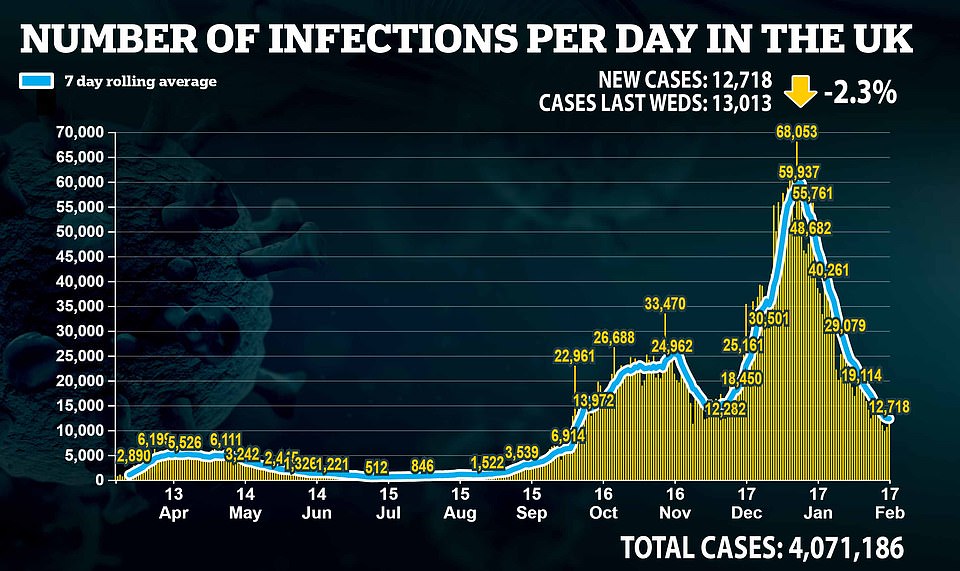
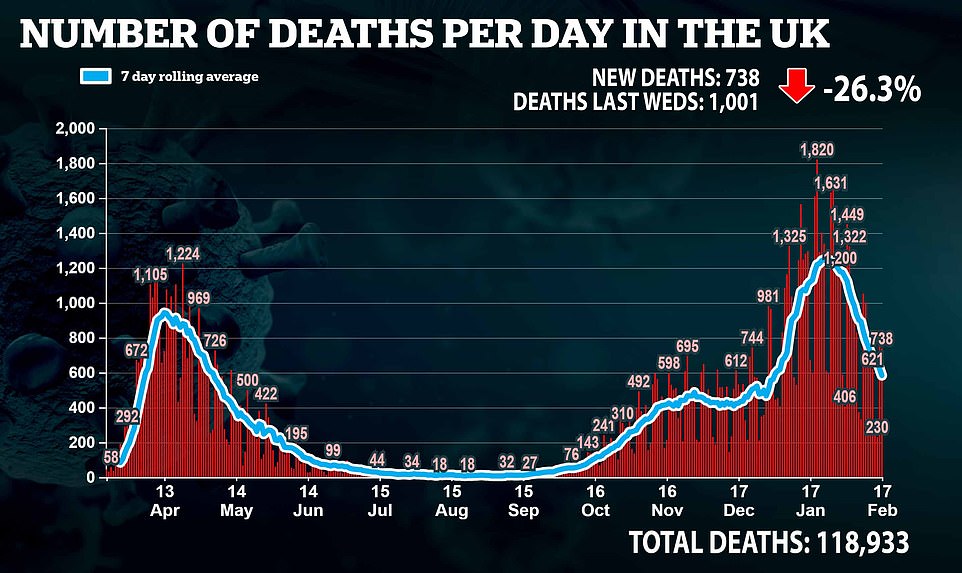
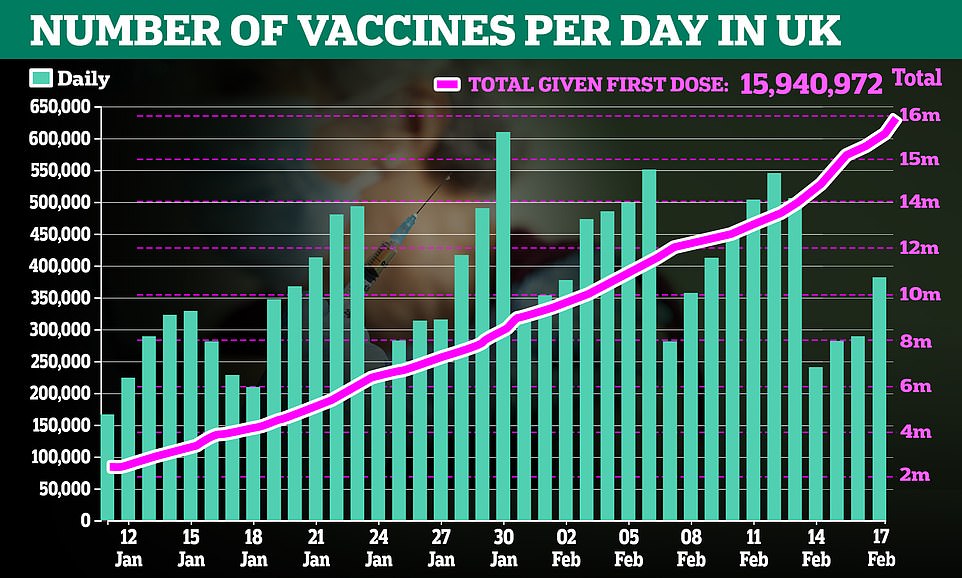
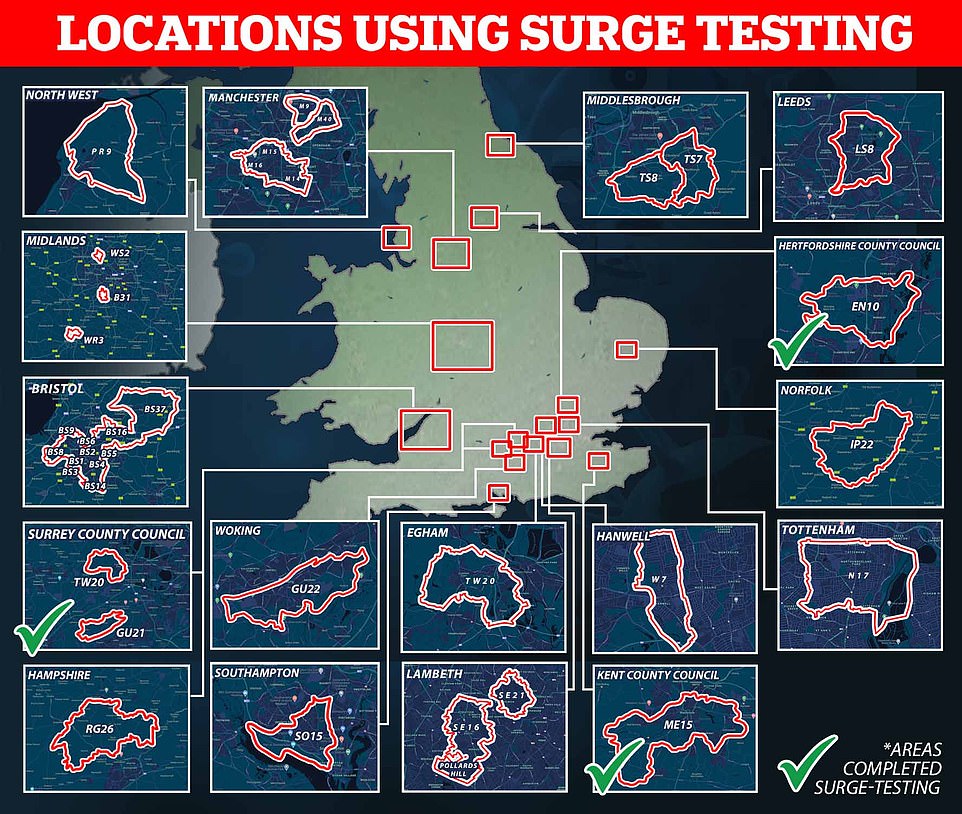
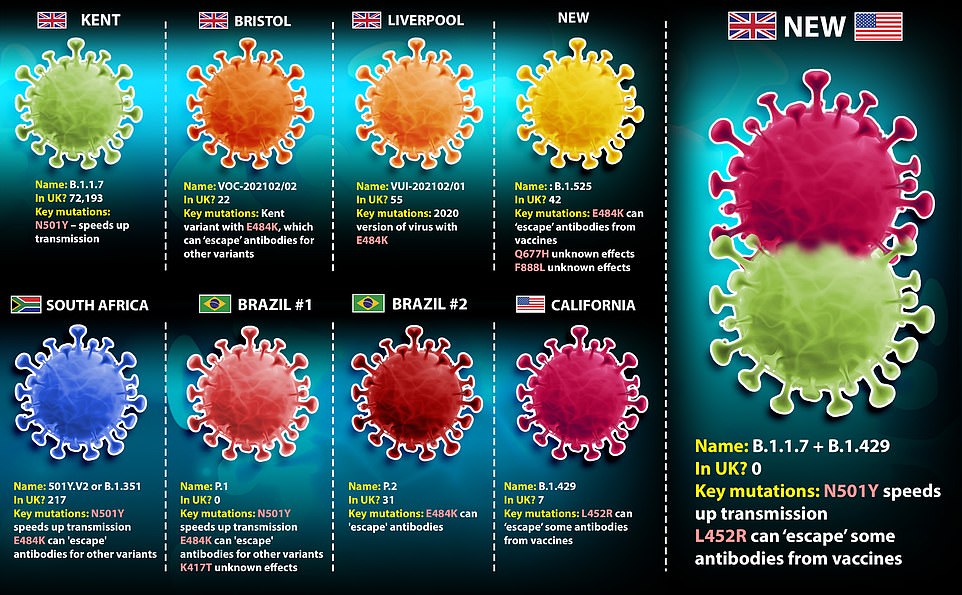
PIMLICO PLUMBERS BOSS SAYS MOST PEOPLE ‘WOULD CRAWL NAKED ACROSS SNOW FOR A COVID VACCINE’
Pimlico Plumbers boss Charlie Mullins today confirmed all new starters at his £50million business would have to take a Covid jab to get a job.
The outspoken owner – who is worth at least £70million – has thrashed out the new papers with his lawyers to make the booster mandatory for all new hires.
And he said he doubted many would object to the new terms, adding ‘people would crawl across the snow naked to get a vaccine at the moment’.
His firm is exploring how it might modify existing staff contracts although he insisted no one would be forced to receive a vaccine or be fired over the issue.
The ‘no jab, no job’ concept has attracted much debate in recent weeks, with care home operator Barchester Healthcare among the other firms which have said all new recruits must be vaccinated unless they have a medical reason not to.
Vaccines minister Nadhim Zahawi has said it is ‘up to businesses what they do’, but trade union Unison has said it ‘is totally unacceptable’ for firms to pressure staff into taking the jab.
But Foreign Secretary Dominic Raab has also refused to rule out a ‘no jab no job’ Covid policy, telling LBC radio yesterday that it is a decision for employers.
And Care Minister Helen Whately told BBC Radio 4 today that the Government’s policy was to ‘make sure that health and social workers can get the vaccine and have all the information they need, and can get it really easily’.
Mr Mullins, 68, said: ‘We’ve obviously been talking to our lawyers and they’re very happy that we can add this proposal to any new workers that start with us once the vaccine is rolled out.
Advertisement
In other developments today:
Patients and MPs urge Boris Johnson to declare ‘long Covid’ an ‘occupational disease’ and pay compensation to frontline staff;Airline industry demands roadmap to recovery so they can plan for summer getaways;Vaccine passports are branded ‘unworkable’ to help save struggling pubs and clubs because drinkers in their 20s won’t get jabs until later this year;Minister Helen Whately hints there WILL be localised restrictions to stop the spread of Covid variants when national curbs are eased;South African Covid-19 variant could reduce protection by two thirds, says Pfizer.
Test and Trace data showed that the number of people getting swabs for the virus remained high compared to the week before, suggesting there was a fall in infections.
Almost 3million people got tested for the virus at least once, which was a drop of 4 per cent on the previous week.
As many as 191,242 close contacts of those who had the virus — which had been near infected individuals for 15 minutes or more — were identified by the system, 27 per cent fewer than the previous week.
Of these 93.6 per cent were reached by tracers and asked to self-isolate, helping to curb the spread of the disease.
The time taken to turnaround tests done at sites increased slightly, however, compared to the previous week. Eighty-five per cent got results in 24 hours, lower than the 86.3 per cent the week before.
The turnaround time for home testing kits also increased, from 34 hours to 35 hours. But the time taken to get results from satellite tests shrunk from 34 to 33 hours.
Boris Johnson had previously promised that all Britons would receive their results within 24 hours.
And Department of Health bosses today said the average distance people travel for a Covid test is now under two miles.
Surge testing was also rolled out to Leeds today, with people in the LS8 postcode, including parts of Harehills and the area just north of Easterly Road where the SA variant variant was found, being ‘strongly encouraged’ to take a test when offered, whether or not they have symptoms.
Announcing the expansion of surge testing, a spokesman for the Department of Health said: ‘People living within this targeted area are strongly encouraged to take a Covid-19 test when offered, whether they are showing symptoms or not.
‘People with symptoms should book a test in the usual way, and those without symptoms should visit their local authority website for more information’.
They added: ‘Positive cases will be sequenced for genomic data to help understand Covid-19 variants and their spread within these areas.’
Earlier this week the department said targeted testing regimes would be set up in parts of Norfolk, Southampton and Woking in Surrey.
Efforts in Manchester to track down examples of the more transmissible Kent variant were also being expanded following deployment of testing teams last week.
It comes as figures today showed coronavirus infection rates have plummeted by more than two thirds since January, in proof that lockdown has worked even against the fast-spreading Kent variant of the virus.
The country’s largest surveillance testing study found just one in 196 people in England were infected with the virus during the first half of February, down from one in 64 the last time around, in January.
Results from the REACT study, led by Imperial College London and commissioned by the Government, revealed 0.51 per cent of the population had the virus between February 4 and February 13, down from 1.57 per cent.
The testing of 85,400 people during this time revealed the R rate – the average number of those infected by each person with the virus – was estimated to be 0.7, meaning the epidemic is shrinking. The figures revealed a ‘marked drop’ in prevalence compared to last month, and a ‘reassuring level of decline’.
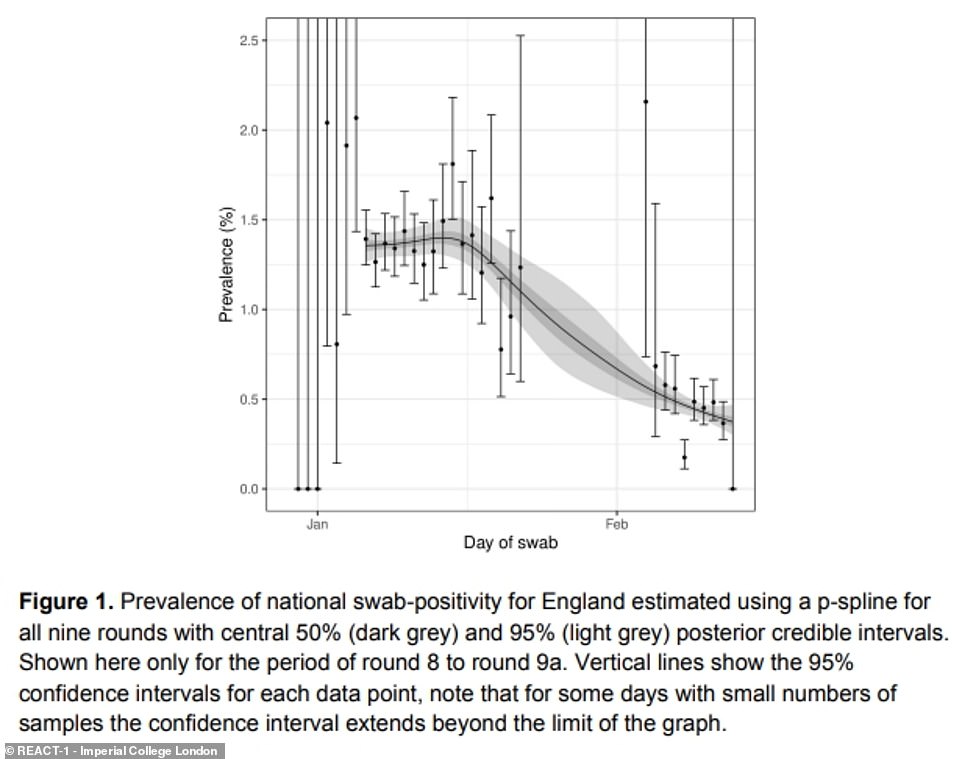
The country’s largest surveillance testing study has found just one in 196 people in England were infected with the virus during the first half of February, down from one in 64 the last time around, in January – the prevalence fell from 1.36 per cent to 0.44 per cent
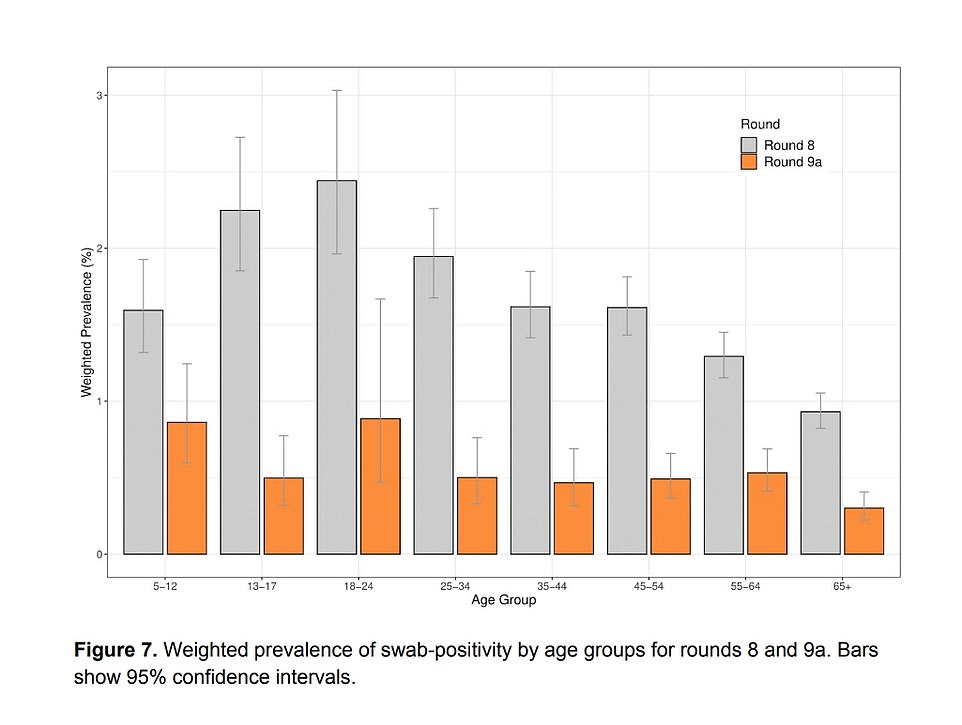
The data shows that prevalence fell across all age groups, but research now suggests the virus is now spreading the most among primary school children and young people. Experts warn that reopening schools would need to be done ‘carefully’ in light of the study data, which shows Covid is most prevalent among five- to twelve-year-olds and those aged 18 to 24

The R rate of the virus – the number of people infected by each person with coronavirus – is now at its lowest point in more than six months, the Imperial College estimates suggest, at 0.72, meaning the outbreak is shrinking
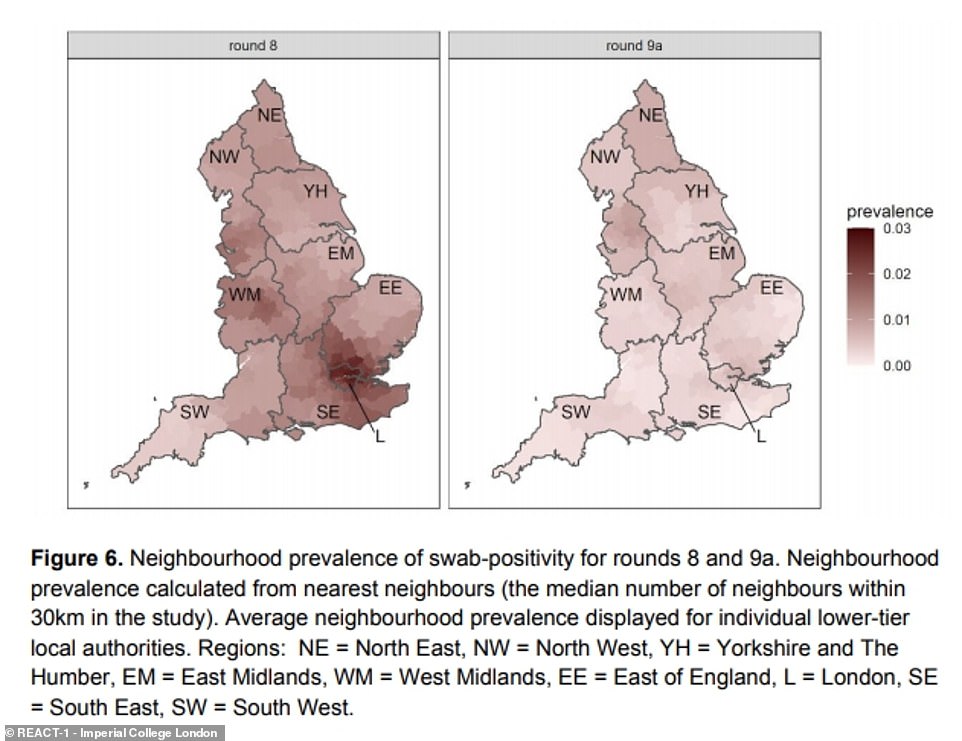
The proportion of people infected with the virus, also known as the prevalence, has come down in all regions of England in the past six weeks, the study found. Darker areas have more people testing positive for coronavirus – the map on the left represents mid-January, and the map on the right mid-February
PREPARE FOR POSTCODE LOCKDOWNS, WARNS MINISTER HELEN WHATELY
Minister Helen Whately today hinted postcode lockdowns will be imposed by the Government to stop the spread of dangerous coronavirus variants when national curbs are eased.
The measures are said to be under consideration in Whitehall as Boris Johnson prepares to unveil his lockdown exit strategy on Monday next week.
Ms Whately appeared to confirm that localised shutdowns will be part of the Government’s tool chest moving forward as she said ministers had ‘learnt during the summer about how to manage localised outbreaks’.
Meanwhile, the Social Care Minister also delivered a boost to families as she suggested care home visiting rules could be loosened within weeks thanks to the success of the UK vaccination drive.
Combatting the emergence and spread of new variants of the disease is viewed by ministers as crucial to staying out of national lockdown and to protecting the vaccine roll-out.
The Government has already used door-to-door testing and a tougher stay at home message in some areas to try to eliminate variants.
And it is thought the localised crackdowns will be a key part of the Government’s approach in the coming months.
A senior Government source told The Times: ‘Clearly it is not a problem at the moment because of the existing lockdown restrictions.
‘But there is a big question about what you do when lockdown does start lifting and we see variants that we have concerns about.
‘It is definitely something that we’re aware of that will need to be considered. But we need to work out exactly what the mechanisms are that we need to have in place.’
Advertisement
The positive news will pile more pressure on Boris Johnson — who was last night facing a growing clamour for the speedier lifting of lockdown.
Amid fears that Covid restrictions might last for months, business chiefs and politicians demanded an accelerated timeframe to save firms from collapse. Also warning of the social cost of lockdown, they cited the vaccine roll-out success and significant falls in deaths and infections.
It comes after bosses from leading UK airlines today called on Boris Johnson to outline a recovery road map for the industry so they can plan for the summer, as passengers arriving from Spain and the US could be added to the ‘red list’.
The chief executives of British Airways, easyJet, Jet2.com, Loganair, Ryanair, Tui and Virgin Atlantic warned that the Government should provide a clear indication of intent that aviation will restart in the coming months.
They said that without this, the UK faces a year of limited global connectivity, and the economic recovery will be hindered. Airlines also called for more economic support to stimulate and strengthen any recovery when it comes.
The firms said the Prime Minister’s lockdown announcement next Monday should include a road map for airlines and consumers to help them plan for the summer and pave the way for the safe reopening of international travel.
UK health officials will decide this week if those arriving from the two countries should isolate for ten days in one of the 16 quarantine hotels approved by the Government in an effort to stop the mutant variants from spreading.
But daily Covid-19 case rates are falling in the US, down to a rolling seven-day average of 77,093 yesterday from 217,703 a month ago; and in Spain, down to 11,939 from 28,829. In the UK, they are down to 12,323 from 46,339.
Paul Charles, chief executive of travel consultancy The PC Agency, said the decision on whether to add Spain and the US to the ‘red list’ will depend on how the UK Government defines ‘high risk’ – in terms of variants or cases.
It comes as bosses from British Airways, easyJet, Jet2.com, Loganair, Ryanair, Tui and Virgin Atlantic today called on the Prime Minister to outline a recovery road map for the industry so they can plan for the summer.
The Cabinet Covid Operations Committee will make their decision using evidence from the Joint Biosecurity Centre. It comes after analysis carried out by the World Health Organisation found dozens of countries where the highly-infectious South African and Brazilian variants had been found were not on the Government’s high-risk list.
They included Austria, Denmark, France, Greece, Japan, Kenya, Norway, Sweden, Switzerland, Belgium, Canada and the US. Both Spain and the US have seen new mutations of Covid-19 transmitted locally and are close to South America and Portugal, which are both already on the UK Government’s ‘red list’.
Source link : https://www.dailymail.co.uk/news/article-9273665/Weekly-Covid-cases-drop-30.html











